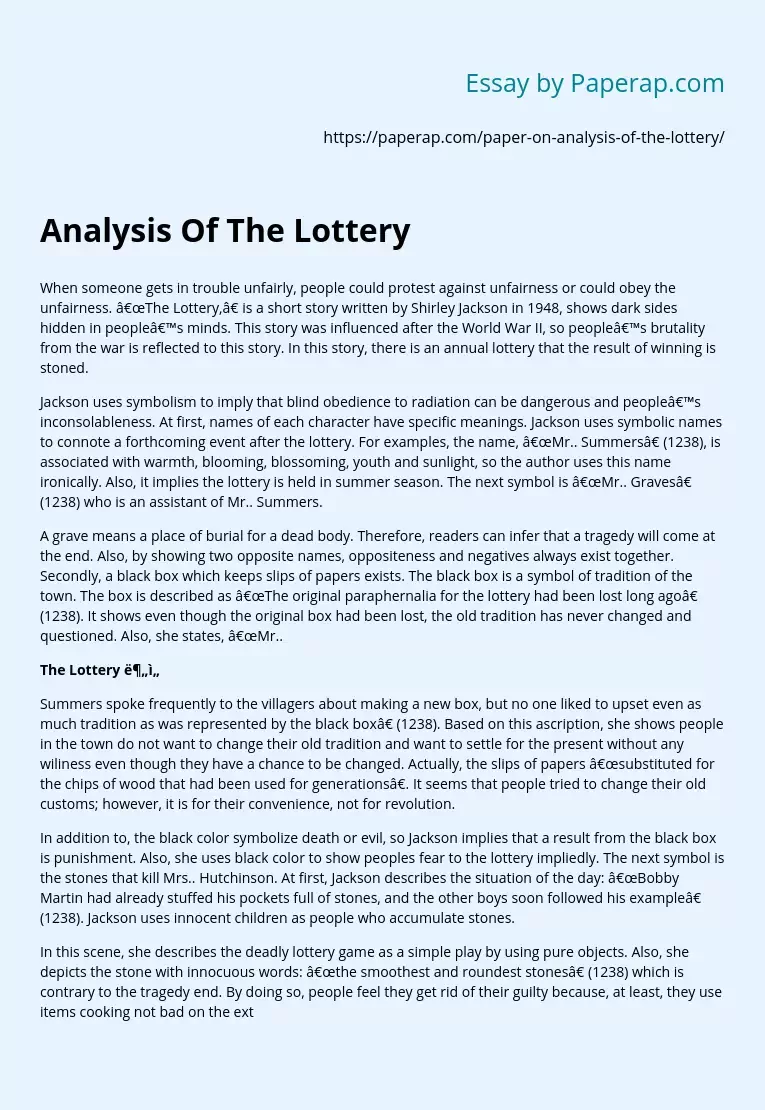Analysis Of The Lottery
When someone gets in trouble unfairly, people could protest against unfairness or could obey the unfairness. “The Lottery,” is a short story written by Shirley Jackson in 1948, shows dark sides hidden in people’s minds. This story was influenced after the World War II, so people’s brutality from the war is reflected to this story. In this story, there is an annual lottery that the result of winning is stoned.
Jackson uses symbolism to imply that blind obedience to radiation can be dangerous and people’s inconsolableness.
At first, names of each character have specific meanings. Jackson uses symbolic names to connote a forthcoming event after the lottery. For examples, the name, “Mr.. Summers” (1238), is associated with warmth, blooming, blossoming, youth and sunlight, so the author uses this name ironically. Also, it implies the lottery is held in summer season. The next symbol is “Mr.. Graves” (1238) who is an assistant of Mr.. Summers.
A grave means a place of burial for a dead body.
Therefore, readers can infer that a tragedy will come at the end. Also, by showing two opposite names, oppositeness and negatives always exist together. Secondly, a black box which keeps slips of papers exists. The black box is a symbol of tradition of the town. The box is described as “The original paraphernalia for the lottery had been lost long ago” (1238). It shows even though the original box had been lost, the old tradition has never changed and questioned. Also, she states, “Mr..
The Lottery 분석
Summers spoke frequently to the villagers about making a new box, but no one liked to upset even as much tradition as was represented by the black box” (1238).
Based on this ascription, she shows people in the town do not want to change their old tradition and want to settle for the present without any wiliness even though they have a chance to be changed. Actually, the slips of papers “substituted for the chips of wood that had been used for generations”. It seems that people tried to change their old customs; however, it is for their convenience, not for revolution.
In addition to, the black color symbolize death or evil, so Jackson implies that a result from the black box is punishment. Also, she uses black color to show peoples fear to the lottery impliedly. The next symbol is the stones that kill Mrs.. Hutchinson. At first, Jackson describes the situation of the day: “Bobby Martin had already stuffed his pockets full of stones, and the other boys soon followed his example” (1238). Jackson uses innocent children as people who accumulate stones.
In this scene, she describes the deadly lottery game as a simple play by using pure objects. Also, she depicts the stone with innocuous words: “the smoothest and roundest stones” (1238) which is contrary to the tragedy end. By doing so, people feel they get rid of their guilty because, at least, they use items cooking not bad on the exterior. However, at the last scene, the stones are used as punishment tools by people who do not pick up a winning slip. It shows people’s selfishness because the citizens throw the stones only for their future which means harvest.
The last and the central symbol is the lottery itself. Actually, winning in a lottery game is related to being lucky. However, In “The Lottery”, it means death and sacrifice. Jackson implies people’s madness from the lottery. For example, she states “Lottery in June, corn be heavy soon. ” (1241 ). They believe hat killing a person by stones bring them a rich year. Therefore, they attempt to rationalize their barbaric and heartless tradition. Also, this story shows people’s obedience to power and conventionality when Mr..
Hutchinson picked up the winning slip. Mr.. Hutchinson says “Shut up Testis” (1241) to his wife who is Mrs.. Hutchinson and at the last scene, when his wife was decided to get stoned, Jackson depicts his attitude to his wife: “Bill Hutchinson went over to his wife and forced to the slip of paper out Of her hand” (1243) . Even though Testis Hutchinson is his wife, Bill treats Testis cruelly. It also shows people’s selfishness. After starting throwing stones, Testis tries to run away, but she is caught by people soon.
The tradition will be lasting after this year lottery. At the last scene Testis shouts out: “It isn’t fair, it isn’t right” (1243), and it implies the tradition is unfair and it should be changed, yet people do not think of changing their old customs. In conclusion, the use of symbolism in “The Lottery’ is very clearly. The author implicates symbols in the story in a society at that time. In my opinion, Shirley Jackson wants to indicate our society in her story. This story strongly shows collectivity, selfishness and madness of people.
The tradition represented as the lottery is shown not to be changed and unquestioned by people’s obedience. Additionally, this story shows that dill makes a joke to his wife and then kills her in a short time it shows how cruel people are. Overall, the author uses symbols indirectly, but also very obvious to imply people’s madness and selfishness.
Analysis Of The Lottery. (2019, Dec 05). Retrieved from https://paperap.com/paper-on-analysis-of-the-lottery/

